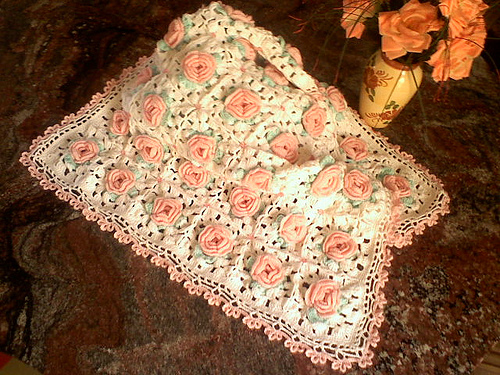[audio: http://fireinthepasture.org/wp-content/uploads/2012/01/Dubrasky_Legacy.mp3]
(My reading of “Legacy”)
In Danielle’s sonnet, the poet explores an intergenerational relationship—and the rippling effects thereof—among three women and one man: the poet, the poet’s grandmother, the grandmother’s brother, and the poet’s great-grandmother. This complex relationship is narrated from the poet’s point of view as she observes her grandmother’s interactions with her material, maternal heritage. Grandma carries this heritage in her habits of being–her characteristic ways of interacting with the world: in the “afghans” she knit and the “roses” she cultivates and that perhaps she learned to cultivate by watching her mother care for her own garden. These objects “give her day a pattern.” And through the routine tasks that make up this daily pattern, she can focus her failing energies and channel away any undercurrents of resentment that threaten to disrupt the placid surface of daily living.
But the violence done her in the past manifests in her present emotional and physical state. When the “memory” resurfaces of having been emotionally and physically neglected by “her mother” in favor of “the favored son”—who got “fatten[ed . . .] with milk” because, apparently, “only boys needed calcium, not girls”—the resentment builds up and “her mouth purse[s].” The emotional force of such pursing is mirrored in the vocal force required to speak the word purse: notice the explosive release of breath and sound come bursting through the bilabial /p/ and slightly suppressed by the /s/. The poet’s grandma represses such emotional explosion with her daily routine—but only partially. That she’s still bitter—and deeply so—comes out in the linguistic friction present in the poet’s retelling of the memory, especially in this phrase, “how her mother would fatten the favored son,” and in the imitative reiteration of Great-Grandma’s claim, which likely remains with the daughter because it was perhaps too often repeated.
Yet, bad memories, destructive language, and bitterness aren’t the only holdovers from childhood neglect. There was also physical and relational damage done. As Grandma explains through the poet, “She gave me weak bones”—and someone to blame for an inadequate skeleton. I also surmise that she got a strained relationship with her brother out of the deal, a brother whose dated gift, the “Dresden shepherdess”—a substitute for his presence in her life and his attempt, marked by the doll’s “milk-white” skirt, to maybe make up for what he got that she didn’t—“darkens” with the physical and psychic space she inhabits as autumn permeates her world. In this space, she, as perhaps the poet, longs to redeem that little girl still “thirsting for milk.” They long to give her language with which she might recover what she lost, if not in bone structure, then in the psycho-emotional scaffolding of a healthy intergenerational relationship, one built on compassion and the desire to connect intimately, empathetically, with another flawed and frustrated, trampled over soul.

